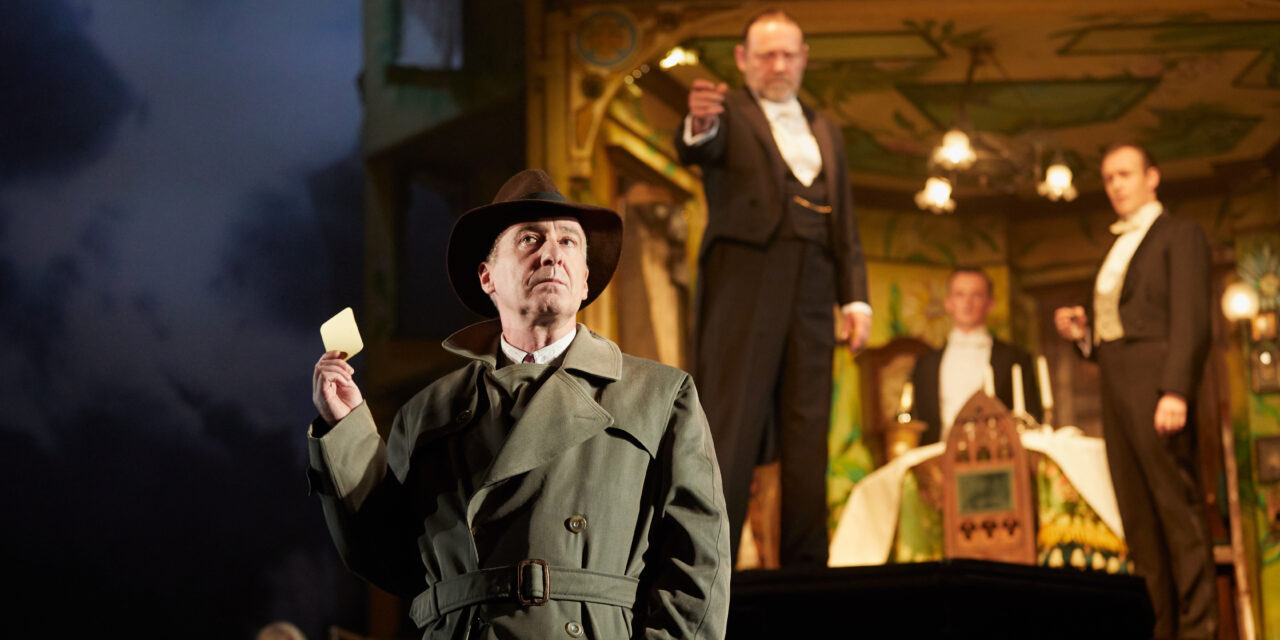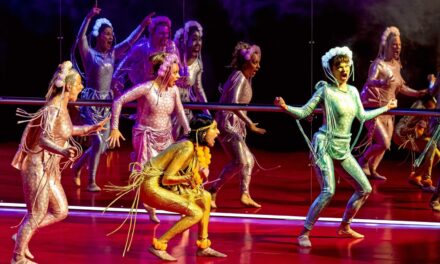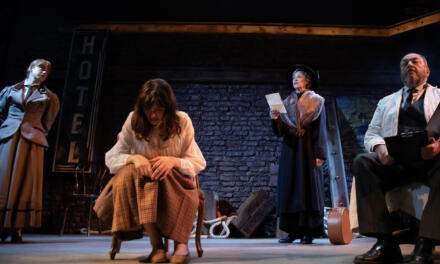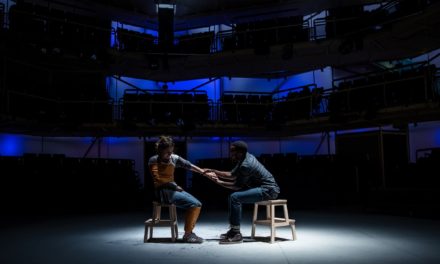In the theatre, it is rare to see a dramatist get second billing to a director. Usually, theatergoers think of a play belonging to a writer, and those performing it, designing it, and directing it as those who bring the text to life. But every once in a while a director’s approach is so noteworthy, and his or her career so illustrious, that the audience feels they are coming to see their vision rather than the play itself.
Such is the case of the touring production of J.B. Priestley’s An Inspector Calls now playing at ArtsEmerson’s Cutler Majestic Theatre. Directed by the Oscar-nominated Stephen Daldry (The Hours, The Reader, Billy Elliot), whose stage productions consist of the landmark West End and Broadway smash Billy Elliot, as well as the triumphant opening ceremony to the London 2012 Summary Olympics, this award-winning version of Inspector Calls eclipses Priestley’s original text and has taken on a life of its own. After winning four Tony awards in 1994 (and nineteen major awards in total), and after it has been attended by over four million people worldwide, Daldry’s production has become a must-see theatrical event for the past three decades.
What a touring show like this provides is the opportunity to witness a revelatory production that blew people away almost twenty-five years ago. It provides a special joy to see the theatrical genius that once worked so well. But even if all the elements of the original are left intact, something about the theatre resists such attempts to re-capture the essence of what it once was. This production of An Inspector Calls is gorgeous, well-acted, well-directed, but for some reason feels as shallow and empty as the upper-class characters it wishes to denigrate. Originally a show that excoriated the selfish individualism of Margaret Thatcher-led neoliberalism, the production has lost its edge and vitality through years of repetition.
The story is about the visit from the mysterious Inspector Goole (Liam Brennan) upon the Birling household (Christine Kavanah as Sybil, Jeff Harmer as Arthur, Hamish Riddle as Eric, Lianne Harvey as Sheila, and Andrew Maclin as Sheila’s fiancée, Gerald Croft). A young woman has just committed suicide, and Goole suspects each member of the Birling family was complicit in the act. While they chide Goole, mock him, and glibly shrug their involvement, he ensnares each individual by asking questions and goading them with their own arrogance and privilege.
The actors are different, but almost every other element is as it was in the 90s. The same magnificent design by Ian MacNeil is employed. The atmospheric effects that have routinely impressed audiences are here employed. Melodramatic music swells and overcomes the audience through the sound design of Sebastian Frost. Rain pours on the stage. Smoke envelopes the scenery, which depicts a gloomy, pre-World War I street. Much of these elements are twinged with the expressionistic, giving the play a nightmarish quality. The lamppost, for one, stands twenty feet tall, towering over the otherwise realistic looking yet doll-like Victorian house, the same set piece that dazzled audiences in the original production. The house rips through the cobbled floor and stands on stilts about five feet above the stage. Its edifice hides the characters who are dining within. We can only see them pass by windows. We can only hear them laugh merrily. It opens up like a dissected cadaver, revealing the characters within, who are much too large to live in this tiny home. Their personalities almost literally spill outside of its frame.
Using this set, the play experiments with ideas of interior and exterior. Even though the script is set within the interior of the Birling household, Daldry has placed almost all the action on the street, just outside the home. The text every so often references the characters still being inside, but we see them traipsing on the cobbled streets, where street urchins and other citizens of the community watch silently. Such a staging choice has literalized what was once metaphoric about realistic cup-and-saucer dramas: while we watch a play set within a family’s home, their lives and secrets are made public to the attending audience. Daldry’s move here unearths and makes even more explicit the heavy-handed socialist messages of the play.
The acting of the piece often times comes off as forced and heavy-handed, but that is likely the point because Daldry’s production offers a pastiche of Edwardian murder mysteries, dripping of melodrama. The actors loud grandstanding and rapid delivery also helps lift a verbose text that could easily verge on the tedious. Because the main driving force of the plot is Goole’s questions, the majority of the play’s story is offered through diegesis—in reference to things that have happened in the past. As the characters recount their memories, we witness the revelation of their guilt.
The actors keep this word-heavy text buoyant, but in so doing also lose all sense of nuance and humanity. Again, this choice might be deliberate, but it contributes to the overall lack of spirit the production has. At its core, the production comes off as a re-presentation, a re-living of events that we the audience are merely witnessing. There is none of the je ne sais quoi, the inherent event-ness of theatrical creation that makes a live performance great.
Part of detachment comes from deliberate defamiliarization, a Brechtian approach to the production. At one point Goole stops the performance and shouts “hold.” Stage lights turn off as work lights turn on. Goole throws blankets over the injured characters and gives a direct address to the audience. These are several of these moments throughout the production, which are meant to make obvious the theatricality of the most emotionally charged moments and put focus on the message rather than the feelings of the production.
That message is one of social unity, of taking care of one another, of treating people as a community and not disposable commodities. It is a nice message. One I agree with. But it also feels impotent. It fails to really touch upon the dangerous and pulsing idea threatening American discourse. It can hardly speak to the alienation and isolation wrought by social media. I believe everyone should go see An Inspector Calls and appreciate its staging. But also to learn from its lessons. It reveals how a revelatory production can become so pedestrian through its own mechanical reproduction.
This post was written by the author in their personal capacity.The opinions expressed in this article are the author’s own and do not reflect the view of The Theatre Times, their staff or collaborators.
This post was written by Matthew McMahan.
The views expressed here belong to the author and do not necessarily reflect our views and opinions.


















